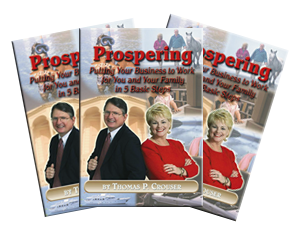
Shipped, Paperback, 324 pages
Some five thousand businesses are listed on major stock exchanges in the U.S. They raised their funds on the equity market. Then there are the twelve to fifteen million of the rest of us-we took our equity from our family in cash, credit, and time. Our businesses are family-based, regardless of whether family members actually work together in the business (and many do).
So, call those stock-exchange giants “big businesses” if you wish, but don’t call our family-based businesses “small.” Nothing that is capable of taking such a toll on our loved ones should be considered small. Newspapers, talk shows, Internet sites, and management theorists all focus on the big players. Well, what about us?
We stand at the crossroad of Prosperity and Purgatory. We can live in the best of times. The vast majority of the people who are prosperous are business owners just like us. We can also live in the worst of times. The chance of our businesses succeeding twenty years is 20 percent in a good economy. The chance of our marriage lasting that long is 50 percent. So the chances of our marriage and our family-based lifestyle business making it twenty years is only 10 percent at best.
This book fills the void in our resources by dealing with our struggle to reach prosperity and to transition that success to a prepared second generation. It is about accepting the challenge of Prosperity’s Litmus Test-because we have these businesses, we must provide more time for our families and more money, not less. And if we are not doing that, we must either fix the business or close it down and get a real job.
Five Steps Include
Step One: understand who we are and what we want. We’re not like big businesses. We’re family based, life-style businesses engaged in Monopolistic Competition.
Step Two: we must use financial facts, not feelings – we need a financial roadmap. The roadmap must be accurate and we must learn how to read it. Fundamentals of finance for the non-financial person.
Step Three: organize around functions, not people. Stakeholders, General Manager, Sales Manager, Production Manager and Finance Manager. What they do.
Step Four: understand how to compete on the real battleground of Monopolistic Competition. Cut your price in half and you won’t double business. It’s about price, product and sales activities. And this includes negotiating as well as selling something to someone.
And Step Five: Prospering. Do all previous four steps at the same time and in order and you can reach Prospering. But Prospering is how you ride, it’s not a destination. You run the business until you don’t. You can’t retire in place. And two challenges you may meet while Prospering, one guaranteed and one most probable. Also information on Preparing Your Successor and Transitioning the Business.
To order, click on ADD TO CART at top of page








